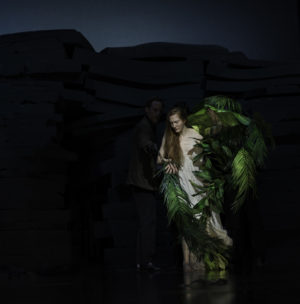You have no items in your cart. Want to get some nice things?
Go shopping
Sometimes, simple things are just the best. “Simple” is perhaps not the first word one would associate with Tanztheater Wuppertal, Pina Bausch’s ground-breaking dance company, which continued to perform even after Bausch’s death in 2009. Yet it’s when Since She, the first full-length work of the ensemble created by a guest choreographer, manages to keep it “simple” that it delivers its strongest performance.
Since She premiered in the UK at Sadler’s Wells this February, and is choreographed by Dimitri Papaioannou, who trained as a visual artist and worked extensively in costume and light design. The show is aesthetically compelling and alluring – sometimes not entirely for the right reasons, but most of the time in a pretty inspired way. For the whole of the 90-minute show, the stage becomes a different (one might even say alien) universe, populated by sinister puppet-like creatures, complex geometric shapes, props, plants, food, textiles, (an awful lot of) furniture and, of course, bodies in motion. The undertones tend to linger on the darker side, largely resembling a spectral, absurd circus. There’s also a painstaking attention to textures, materials and surfaces – their overlapping and permutations are a continuous source of fascination, culminating in a colour-changing, iridescent golden panel at the very end, which is simply too good to be true.
Papaioannou, who describes the performance as “a love letter to Pina, full of nostalgia and respect”, manages to imbue his piece with gloomy theatricality. It’s hard to keep a record of all the actions the cast perform on stage. There’s wrapping, gliding, cutting, dragging, rinsing, crawling, washing, twitching, cooking, squirting, rolling – the list goes on. While more often than not the stage presence of the performers manages to make what we see worth seeing, there are times when the pace is too slow to hook. When the end product is (merely) macabre detachment, there’s a sense that something’s missing. Occasionally gimmicky and not consistently convincing, some sequences can leave us quite puzzled (even for Tanztheater standards) – though some other have still the merit to prepare us for the most juicy bits.
These are undoubtedly the scenes where there’s a clearer sense of danced movement (in the wider sense of the term). When there’s music and simplicity, that’s when Since She is truly nourishing and inspiring. The opening sequence with chairs, the man walking “inside” two wooden poles, the woman floating in a paper dress, the navigation of the stage using two reversed tables – Papaioannou knows how to enchant his audience. The (perhaps unintentional) lesson I got was a philosophical one: things don’t need to be elaborate, mind-blowing, shocking. The beauty of Tanztheater is that it can make the simplest things powerful. Even just a chair (i.e. Pina’s iconic black chair, as seen in Café Müller) can be incredibly meaningful. And in general, it is where the strong aesthetic is complemented by music and dance that the show really comes to life.
Overall, I felt that Since She had much in common with the luxurious, desolate, at times ostentatious aura of Paolo Sorrentino’s La grande bellezza. The sequences with slow, controlled movement, startled face expressions, and a generic sense of haughtiness seem to come straight out of that world – and, as in Sorrentino’s film, they are not entirely agreeable. Those are the moments when the audience is left to drift away, loosening the threads of theatrical suspension. But the piece as a whole, with its eerie imagination and thoroughly unpredictable twists and turns, is at once a powerful testament to Bausch’s legacy and a resolute endeavour to give Tanztheater a future. As weird as out-of-this-world as it might be, it had to be staged.
About Anna Zanetti
Anna graduated from the University of Oxford with a BA (Hons) in Classics, specialising in Literature, Aesthetics and Ancient Art. Currently based in London, she has eclectic interests, including avant-garde art, cycling, reading, contemporary dance, opera, (watching) rugby, and anything to do with Latin. She writes for The Oxford Culture Review, Theatre Bubble and A Younger Theatre, as well as keeping a personal blog about arts and culture.
- Web |
- More Posts(10)





One comment